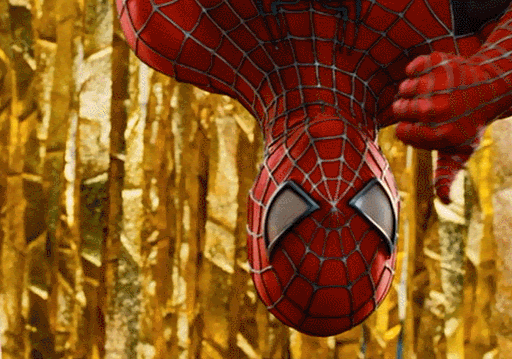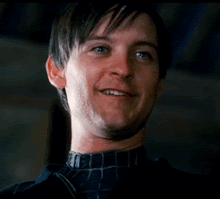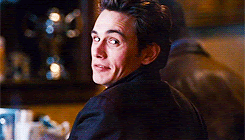By Grace A. Johnson
This may seem hard to believe, but when you have brothers, watching Pride and Prejudice and Hallmark romances is unacceptable. Instead, you waste a week of your life bingeing the original Spiderman trilogy and are left with the image of Tobey Maguire dancing outside of the clothing store embedded in your brain. Trust me, that does not make for pleasant dreams.
What it does do, however, is provide you with food for your conscious thought - specifically about heroes. I started comparing Tobey Maguire’s Spiderman to Tom Holland’s (as I’ve not seen Andrew Garfield’s portrayal yet) and noticed some very stark differences - and I don’t mean in appearances. Even though Holland’s Spidey is more realistic in terms of age, is more...pleasing to the eye, and doesn’t do the dance, Maguire’s still brings some things to the table that the newer Spiderman doesn’t.
For example, Maguire’s Spiderman is more emotionally involved, more human and fallible, and of course the addition of his origin story makes his entire trilogy more engaging. Holland’s isn’t the same, and although he does have his own individual merits, I didn’t feel the same connection to 2016 Peter as I did to 2001 Peter, you know?
Because of that, my post today will be tailored to Maguire’s Spiderman, even if some of the points I make may fit with Garfield’s and Holland’s and other portrayals.
Spiderman teaches us a lot of things about heroes that transcend or redefine the classic idea, from proper motivation and emotional involvement to being made rather than born and taking on different roles depending on the perspective. So why don’t we dive into how you can apply these elements to your hero too! (Please note that there will be spoilers for all the original Spiderman movies and the new Spiderman movies.)
Heroes Are Ordinary People
Who Make Mistakes
I know it’s pretty obvious, isn’t it? Not everyone is Superman. Not everyone is perfect. Including your hero. We know that, don’t we?
But do we apply it?
Peter Parker is ordinary in every way - from his backstory to his appearance to his DNA. The only thing exemplary about Pete is his nerdiness - pardon me, intellect. Otherwise, what’s special about Peter Parker? He deals with loss like any other person, can’t catch the eye of his crush like I’m sure most of us can empathize with, and is often lost in the sea of faces.
Even when he gets bit by a spider and is given amazing powers and abilities, he’s still ordinary. He still works a job. He still has grief and guilt. He still struggles in relationships. He still screws up - and often, I might add.
And, boy, the mistakes Peter makes! (More on that later…)
Marvel (and the screenplay writers and director) apply the imperfect ideology so well. They keep with who Peter is behind the mask to create a stronger and more realistic hero in front of the mask. They don’t make every element of his life easy and perfect for him. They don’t make him do the right thing every time. Yeah, Peter even loses the girl, his best friend, and almost his aunt, on top of losing countless times to the bad guys.
This just shows us that heroes are not born - they are not instantly generated after a spider bite. They’re made. Carefully crafted through failures and trials. Comprised of all the good choices and the bad choices too. Sometimes, for all the good your hero does, they don’t often make the ultimate sacrifice or become a true hero until the end of their journey (i.e., the end of the book or movie).
How can we too apply this ideology and make our heroes real and true? Try following some of the steps taken with Spiderman:
Heroes Need Proper Motivation
You always hear about villain’s motives, criminal’s motives, motives for murder...but what about your hero’s motives? I mean, as noble as it sounds, very few people would risk their lives for what’s right if they have no motivation.
Spiderman is a perfect example of a hero with motives. He wants to make up for the wrong he did by not stopping the thief who was responsible for his uncle’s death. He wants to make Uncle Ben proud. He wants to put his powers to good use. He wants to be somebody. He wants to be valued. He wants to make a difference. There are a myriad of ways he could have gone about doing those things, but he chose to fight crime and save damsels in distress.
These motives are what put him on the path to becoming a superhero, and they’re the same motives that carried him through all the rough patches. When he gave up being Spiderman so that he could date Mary-Jane in the second film, what brought him to his senses and pushed him to don the mask once more?
His uncle Ben.
Now, not everyone has an Uncle Ben (unfortunately) and not everyone gets bitten by a genetically modified spider (fortunately), so before you assign your hero an epic journey or secret mission, take some time to think about what will motivate him to do good and what will keep him going when the going gets tough. I recommend asking yourself these questions:
Heroes Will Be
Emotionally Involved
This point plays off of the last two, and it also brings us back to the comparison of Maguire’s Spidey to Holland’s Spidey.
When we meet Holland’s Spiderman in Captain America: Civil War, he already has his powers, Uncle Ben has already passed away, and as Peter’s story continues in Homecoming, we see how his character and the relationships he’s in greatly differ from Maguire’s Peter. For example, there is no Harry.
Instead, 2016 Peter’s best friend is loveable, funny Ned who soon discovers Peter’s real identity and doesn’t try to kill him for it. There’s also no Mary-Jane (although we do technically have a MJ, but we’re focusing on Homecoming for now). We have Lizzy, who’s father is the main villain in the movie, but aside from the initial shock when Peter realizes that he has a crush on the Vulture’s daughter, there isn’t as much conflict as there was between 2001 Peter, his best friend Harry, and Harry’s father, the Green Goblin. In fact, that storyline is wrapped up at the end of the first movie, rather than carried throughout the entire trilogy.
Because of these differences (which have pros and cons of their own), I never felt like Holland’s Spidey had the same emotional involvement that Maguire’s did - yes, there was a level of emotion which grew after Tony Stark’s death and the deal with Mysterio in Far From Home, but it wasn’t the same. At least, not for me. You take it how you will.
Regardless, it got me thinking. Spiderman wasn’t just fighting random thugs on the street.
He was fighting his friends. People he knew and cared about. Unlike Superman or Batman and their villains, Peter Parker’s personal life was entwined with those of his adversaries. Even Sandman/Flint Marko was the man who shot his uncle, and Eddie Brock was the man who stole his job and tried to ruin his reputation.
As I was saying, this emotional involvement and the struggles that ensue all stem from the humanity of your hero (or, in case your hero is a Hobbit, the ordinariness of your hero). And it’s all part of his motives as a hero. Having a hero with an emotional or personal stake in the outcome of the current situation is imperative to making them more real and relatable. (Because, c’mon, tell me Harry wasn’t the only one who was “gonna cry.”)
Now, not all of us feel like utilizing the classic the-villain-is-my-best-friend-or-my-best-friend’s-relative-or-my-love-interest trope (or, worse, the-villain-captured-my-girlfriend, which it seems is Spidey’s favorite)...so what are some other ways we can weave our hero’s life into the battle for truth and justice?
Heroes Can Be the Villain or Cause
Wait a minute, you say. We’re talking about the hero, right? How the heck could he possibly be the villain?
Well, don’t get your panties in a wad. Spiderman proves my point quite nicely. Just think about the circumstances of his story...his villains...all the MJ kidnappings and fights gone awry. Who really caused most of them?
You guessed it. Spidey himself.
Spiderman ruined Eddie Brock’s life, which gave Venom a new host, thereby causing the end battle scene in the third movie. On that note, if it weren’t for Peter keeping a sample of the symbiote in the first place, the events of the movie wouldn’t have taken place at all. Spiderman brought a deceased Green Goblin back to his house right when Harry walked in, putting Harry on the road to destruction. And then there’s MJ. Obviously, it’s all Peter’s fault for her getting captured all the time.
See what I mean?
Sometimes, heroes make ginormous mistakes that create a villain, motivate the villain, or put people in harm’s way. Not only can this tie in to developing your source of conflict (whether it’s a single villain, an evil organization, or a mysterious force), but this lends your hero another level of depth. It’s not just motivation and emotional involvement; it’s outright guilt. Even in the Avengers or the Incredibles, we find the heroes causing a great deal of the problems...and even being punished for them. Think of how that will add more to your hero’s story and strengthen his arc.
Of course, now’s the time for me to give you some suggestions, so let’s dive in!
All in all, I think we can agree that Spiderman is an ordinary nerd off the side of the road who was in the wrong place at the wrong time, got crazy powers, did some stupid stuff, and still came out on top. We should also be able to agree, after reading this really long (possibly boring) article, that we can learn a lot from Spidey’s failures and successes.
Take a look at your hero or heroine and see how well you apply mistakes, motivation, emotional involvement, and general stupidity and lapses in good judgement to strengthen their character and make them a better and more realistic hero.
Does he have moments of selfishness and personal struggles? Is his personal life entwined with the issue at hand? What motivates him to keep going and fight the good fight? What inspired him to take a stand and save the day in the first place? Where does he falter and cause problems? Is he the true villain of the story or the reason behind some of the world’s problems (or at least MJ’s problems)?
What about other heroes - super or otherwise? How have they failed or made mistakes? How are they emotionally involved with the villain’s evil schemes? What is their motivation?
And while I’m asking...Maguire’s Spiderman, Garfield’s, or Holland’s?
Which is your favorite?
Grace A. Johnson
Grace A. Johnson first began writing at four. Of course, in those days her stories were merely scribbles. As time went on, she went from princess stories to Barbie picture books to some of her very first novels at ten.
Held Captive was one of the first, and was published after nearly two years of hard work. She is now a college student balancing her home-life with her schooling and her writing. Her greatest inspiration is her Savior and friend, Jesus Christ, and her one mission is to reach others for him.
She writes at: https://www.graceajohnson.com






Ooh, I love your articles, Grace!
All your prompts and questions are giving me so many ideas and a desperate longing to pick up a pen (and that ‘he was once evil too’? I so want to do that now)
I can’t say if I have a favourite Spiderman..because I have never seen either of them, but you did an awesome job of comparing them and I feel like I know all the pros and cons of both.
Awesome post!
Thank you so much for sharing. 🙂
Thank you SO much, Malana!
Yeeeessss…do it!!! (Tbh, I got myself pretty excited with that one too!)
Aw, thank YOU! It was my pleasure to write, and I’m glad it’s inspired you! 🙂
I am very sad to admit I have yet to see Maguire’s Spiderman, but that did not stop me from getting so much out of this article! It was so fun to read while also making me so inspired to write. Especially with the prompts at the end of each point. Totally going to be using those.
Haha, you don’t know what you’re missing, Kathleen! XD I’m so glad you found it helpful and that you liked the prompts! I had a ton of fun coming up with them!
Honestly, the only one of these movies I’ve seen was the animated one. But this is very interesting!
Aw, thank you!
This was certainly not a boring article! Thank you for sharing the tips. And I’m not even super familiar with Spiderman!
Ahh I love spider-man! This actually helped a lot (even though my MC is, let’s say, not a good person) I’ve only watched Homecoming and Far From Home, so I’d have to say Holland’s spider-man is my favourite
Thank you for this article! Why Spider-Man is my favourite in a nutshell. 🙂